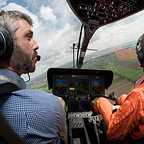Are you ready for an aviation masterclass?
The internet is a fantastic tool for bringing people with a common passion together. But it’s not the place to teach people how to fly.
The web is a fantastic tool to unite the otherwise disparate aviation community. With the rise of action cameras and social media it has never been easier to share your flying experiences, and this is a positive thing, both for flight safety and to bring new interest. However, as with everything on the internet, a sense of perspective and context is essential.
In the information age, knowledge is only a click away. If I want a recipe, I Google it. Need a demonstration of technique? YouTube. It’s the democratisation of expertise. I regularly seek tips and advice on subjects ranging from cookery to building scale models, and techniques that don’t work for me can be discarded while the real gems are retained. The problem is, I still regularly burn the dinner and I have more models in the bin than on the shelf.
That’s partly because refined skill relies on physiological cues that are best taught in person. It’s also because most of the people I’m taking cooking advice from aren’t professional chefs — they’re just doing what works best for them in their own kitchen.
Anybody can share their understanding of topics for others to learn from, and this too could be a really useful tool in aviation; we all make errors when we fly, of varying magnitude. Those with the confidence to expose their mistakes online provide us with a rich resource to consider our own procedures and practices — I recommend FlightChops for precisely these reasons.
I like to think that my bullshit detectors are pretty sensitive though; I’m a reasonably sceptical individual at the best of times. I’m aware that generations younger than me, who don’t remember life without the internet, have an even finer tolerance than I do.
But being a bit of a human factors geek, I’m also aware that familiarity can breed an unjustified sense of trust. People are more prone to take at face value that which is presented to them online, particularly from those similar to themselves — a point made by researchers at McMaster University in Ontario in 2002, and the University of London in 2013.
It’s also very easy to present an illusion of expertise, especially if you have the confidence and technical ability to present well on video. This is easily misinterpreted — or misrepresented — as what I would call ‘credible authority’, i.e. that conferred by a formal qualification or a degree of experience built up over time.
I’m going to stick my neck above the virtual parapet here and suggest that the information generation have a lower threshold for expertise than their elders. This is not a reflection on their intelligence. The communication network that has been a central pillar in their lives is full of people quite happy to offer their advice on a topic they themselves have only just embarked upon understanding. They’re used to learning from fellow students.
Everyone is absolutely an expert in their own experience, but that shouldn’t be confused with being an expert in a subject field. It’s one thing to offer tips on how to bake brownies, assemble a PC or build an Airfix kit. But I’m not going to come to any harm if my Spitfire’s wings go on backwards. It’s quite another thing to offer advice to all and sundry about how they might like to approach practicing stalling their aeroplane. Especially if you yourself can’t manage to keep the ailerons neutral during your ‘demonstration’, and your lookout scan consists of making sure the camera is still facing you every five minutes.
I’m not having an ageist rant here (we are all susceptible as the research makes clear), nor suggesting that young people can’t be flying experts. They can of course, although there’s an obvious lower age threshold given that you can’t fly solo in a powered aircraft until you’re 16.
The point is that there is a well-established qualification for those deemed competent to offer flying instruction — the Flying Instructor rating.
By all means post your cockpit videos for open and honest debriefing and discussion, or highlighting errors, but if you’re not a flying instructor you really shouldn’t be offering advice on technique, whoever you are. What’s more I think most flying instructors would agree that while the cockpit isn’t the ideal classroom, it’s much better for teaching people to fly than a laptop.
It is vitally important that pilots and flying organisations engage on social media, particularly young ones. This is not only to broaden public awareness of flying and attract new members, but also to reinforce the authority of expertise rather than the apparent authority of presentation.
